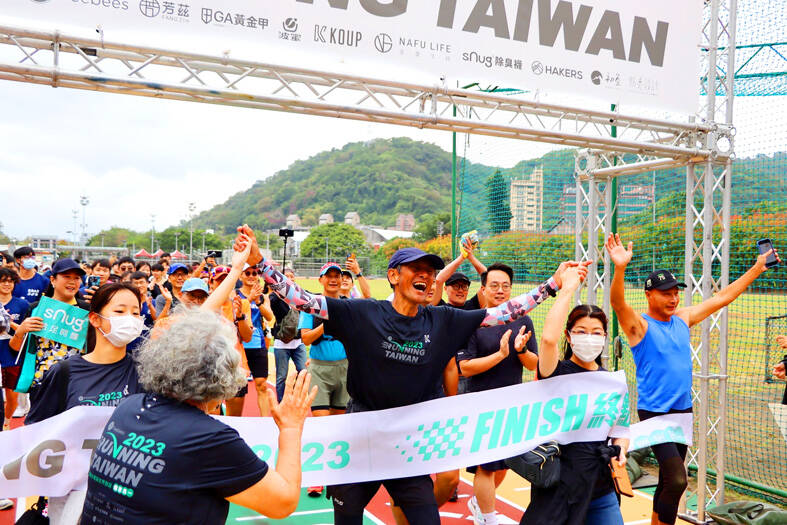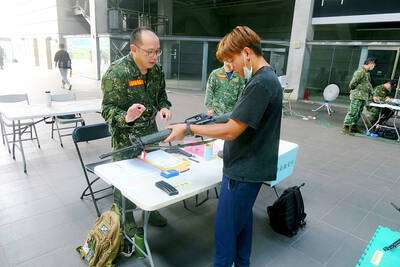Japanese ultramarathon runner Ryoichi Sekiya finished a 17-day run around Taiwan proper on Thursday, saying he hopes that world peace could be achieved one day soon, according to a statement released by Soochow University.
The 56-year-old started his 1,115km run at Soochow University in Taipei on Nov. 14 and finished at the same location on Thursday, the statement said.
He completed the last section of the route hand-in-hand with his wife and daughter and was moved to tears in the arms of his 83-year-old mother, who waited for him at the finish line.

Photo courtesy of the Soochow University via CNA
Shouting “Taiwan No. 1!” in Mandarin at the press conference after finishing, Sekiya thanked Taiwanese for their help and encouragement, which he said helped him complete the challenge, adding that he was particularly moved to see many Taiwanese join him and run part of the way.
“Running together” is also a metaphor, as Sekiya said he received much help and was warmly welcomed by members of the university’s alumni association during the journey.
That experience demonstrated the friendship between Japan and Taiwan and the possibility of having meaningful exchanges between the two countries, Sekiya was quoted as saying in the statement.
With multiple wars around the world, including between Russia and Ukraine, and Israel and Hamas, Sekiya said running around Taiwan is his way to promote world peace.
One of the best-known ultramarathon runners in Japan, Sekiya is a four-time winner of the 24 Hour World Championship, organized by the International Association of Ultrarunners (IAU), and has won the IAU-endorsed Soochow International Ultramarathon in Taiwan eight times, including seven times in a row, his last victory in 2012.
The Kanagawa-born runner became the first non-Taiwanese to run around Taiwan proper 11 years ago, his first run in 2012 being to express his gratitude for the country’s efforts to help Japan after the Tohoku Earthquake and Tsunami in 2011.
Destiny brought him back to Soochow University, the location of his eight victories, 11 years later.
Comparing his two runs around Taiwan, Sekiya said the infrastructure in eastern Taiwan has improved a lot in the intervening years, but Taiwanese people remain as kind and enthusiastic as ever.
Sekiya’s wife, Kaori, said her husband had undergone foot surgery a few years ago, and that the doctor said it would greatly limit the distance he would be able to run.
What Sekiya achieved this time has far exceeded the doctor’s expectations, she said.
Decades of ultradistance running caused severe wear and tear in Sekiya’s right foot, on which he had operations in 2016 and 2017, after which he can run pain-free.
“I will surely come back to Taiwan,” Sekiya said.

A magnitude 6.4 earthquake struck off the coast of Hualien County in eastern Taiwan at 7pm yesterday, the Central Weather Administration (CWA) said. The epicenter of the temblor was at sea, about 69.9km south of Hualien County Hall, at a depth of 30.9km, it said. There were no immediate reports of damage resulting from the quake. The earthquake’s intensity, which gauges the actual effect of a temblor, was highest in Taitung County’s Changbin Township (長濱), where it measured 5 on Taiwan’s seven-tier intensity scale. The quake also measured an intensity of 4 in Hualien, Nantou, Chiayi, Yunlin, Changhua and Miaoli counties, as well as

Credit departments of farmers’ and fishers’ associations blocked a total of more than NT$180 million (US$6.01 million) from being lost to scams last year, National Police Agency (NPA) data showed. The Agricultural Finance Agency (AFA) said last week that staff of farmers’ and fishers’ associations’ credit departments are required to implement fraud prevention measures when they serve clients at the counter. They would ask clients about personal financial management activities whenever they suspect there might be a fraud situation, and would immediately report the incident to local authorities, which would send police officers to the site to help, it said. NPA data showed

ENERGY RESILIENCE: Although Alaska is open for investments, Taiwan is sourcing its gas from the Middle East, and the sea routes carry risks, Ho Cheng-hui said US government officials’ high-profile reception of a Taiwanese representative at the Alaska Sustainable Energy Conference indicated the emergence of an Indo-Pacific energy resilience alliance, an academic said. Presidential Office Secretary-General Pan Men-an (潘孟安) attended the conference in Alaska on Thursday last week at the invitation of the US government. Pan visited oil and gas facilities with senior US officials, including US Secretary of the Interior Doug Burgum, US Secretary of Energy Chris Wright, Alaska Governor Mike Dunleavy and US Senator Daniel Sullivan. Pan attending the conference on behalf of President William Lai (賴清德) shows a significant elevation in diplomatic representation,

The Taipei City Reserve Command yesterday initiated its first-ever 14-day recall of some of the city’s civilian service reservists, who are to undergo additional training on top of refresher courses. The command said that it rented sites in Neihu District (內湖), including the Taipei Tennis Center, for the duration of the camp to optimize tactical positioning and accommodate the size of the battalion of reservists. A battalion is made up of four companies of more than 200 reservists each, it said. Aside from shooting drills at a range in New Taipei City’s Linkou District (林口), the remainder of the training would be at